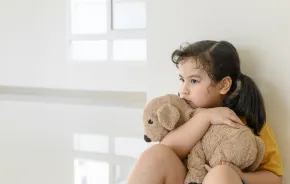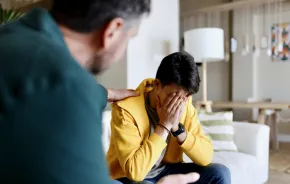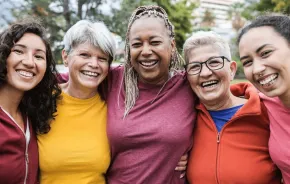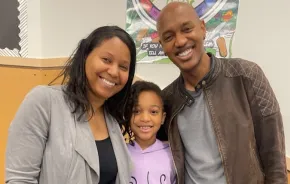
For parents, keeping our children safe is our No. 1 priority. We sign them up for swimming lessons, teach them how to safely cross the street, make sure they wear their helmet and spend hours interviewing child-care providers. The last thing we want to think about — or know how to talk about — is our children being hurt or abused.
But having open, frank conversations with our children about such topics might be one of the most important things we as parents can do to keep them safe from harm.
April is National Child Abuse Prevention Month, and we were lucky enough to connected with Tia Kim, Ph.D., vice president of education, research and impact at the Committee for Children. Kim is a developmental psychologist with a background in the social-emotional development and well-being of children and adults. She answered our questions about how to best protect our children — and other children in our lives — from experiencing abuse, and how to support them if they do disclose abuse.
Why do you think the “stranger danger” myth has persisted?
Research shows that in over 90 percent of child sexual abuse cases, the perpetrator is someone the child and the family know. And that is a really uncomfortable truth for us to accept as parents: that it’s often not someone we can easily help kids identify, such as a stranger in a dark alley or an adult in a van with candy, but rather someone who is a family member or one of the parents’ friends.
All parents want their children to be safe, healthy and thriving. And it is hard, painful even, to reconcile that statistically some of the people the family might trust may not actually be trustworthy. That’s why it’s so important that we teach children how to identify a trusted adult themselves and to never keep secrets. These are critical safety skills.
You talk about teaching children that it is not okay to keep secrets. How do you explain to children the difference between keeping a secret versus a surprise?
One of the easy ways for families to explain secrets and surprises to kids is in terms of what can be shared. Surprises will always be shared eventually and often feel exciting. Secrets are never shared, might make children feel anxious or nervous, and that makes them unsafe. In practice, what this looks like is telling a child something like, “The only safe secrets are ones that can eventually be shared, like birthday surprises. That’s why we never keep secrets about touching.”
One tip I also like to recommend to parents is teaching children to listen to their gut to help them recognize an unsafe situation, especially if someone asks them to keep it a secret. You can say something like, “Pay attention to different feelings in your body, like butterflies in your tummy. That might mean a situation is not okay and might not be safe. If that happens, never keep it a secret and tell me right away.”
Can you describe what/who a “trusted adult” is? Why is it important for children to have trusted adults other than their parents in their lives?
A “trusted adult” is someone a child has a close relationship with and feels comfortable disclosing information to. It may be someone that they trust who has exhibited trustworthy behavior in the past. It may also be someone a child feels safe with, knowing that they will be supported — and not judged — if they were to disclose to that person. It’s important for children to have trusted adults who are not just parents and caregivers, because unfortunately, sexual abuse could be perpetrated by someone the child knows well, including parents/caregivers. Thus, they need other adults or peers they can trust and report to if something happens to them.
What if a child discloses abuse to me? What am I required to do? What should I do?
The most important thing to do is believe a child when they disclose abuse. Children rarely lie about experiencing sexual abuse. It’s also good to practice active listening and ask open-ended questions. Listen carefully and repeat back what you’ve heard and don’t rush them or insist on details. Remaining calm and composed can also help a child provide more information.
If you are a mandated reporter — for example, a teacher — you should follow the policies set up for mandated reporting.
What are three things parents can do to help keep their kids safe?
Research shows that simply talking openly with your children about personal safety is one of the most powerful ways to protect them from sexual abuse. Anytime is the right time to talk.
The most important aspect of these talks is to create an open line of communication. In particular, it’s important to teach your kids the 3 R’s of personal safety and protection. Teach them to: Recognize wanted versus unwanted touches; Refuse unwanted touches; and Report abuse if something happens to them.
It's also important to establish family safety rules. For instance, to always ask first before they go somewhere or let you know when they receive something from someone.
What should adults do if they suspect a child in their life might be experiencing abuse?
It’s important to always keep open lines of dialogue with your child. This makes it easier to start to ask questions if you suspect a child is experiencing abuse. For instance, with older children you can say, “Relationships can be hard. Let me know if you ever want to chat about how things are going.” If you have built a safe, supportive environment over time with your child, they will be more willing and comfortable to disclose information if something is happening. And during these conversations, practice active listening and don’t rush them or insist they provide details.











